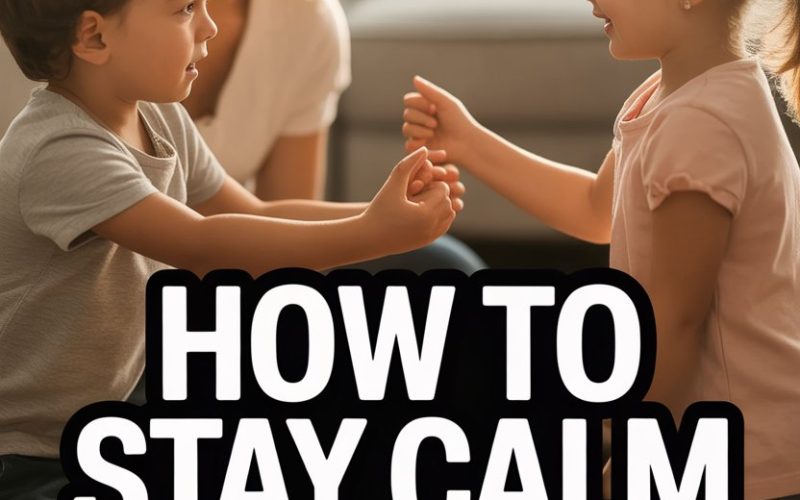Picture it: You’re desperately trying to zip your child into a coat (wrong coat, apparently), someone’s shouting about Peppa Pig, and your phone is buzzing with work emails.
Staying calm? Feels about as likely as finding a Lego-free floor. But letting behaviour slide? Not an option either.
Busy parents everywhere want to keep their cool—without turning into a doormat.
Here’s how to keep things together, set boundaries, and parent with your sanity (mostly) intact.
Choose Your Battles, but Don’t Surrender the War
Every day presents umpteen opportunities for your child to push boundaries.
Colourful socks with sandals? Fine. Biting their sibling because they wanted the blue cup? Not fine.
The key is knowing which issues are truly non-negotiable in your family. Think safety, kindness, respect.
When you save your energy for the moments that matter, you’re far more likely to respond calmly—and your kids take your “no” seriously when it counts.
And yes, sometimes “counting to ten” isn’t long enough, so take a deep breath… or twelve.
Hold the Line with Compassion
Children have bad days too (usually when you’re already late). Showing empathy doesn’t mean excusing unacceptable behaviour.
Try: “I see you’re upset because you want more screen time. It’s hard when fun things end. But the answer is still no.”
Phrases like these acknowledge feelings while standing firm on rules. According to the American Academy of Pediatrics, this balances warmth with authority, helping children feel heard without running the show.
Silent Screaming: Your New Superpower
Sometimes, no amount of gentle phrasing will stop a meltdown. Your child is losing it, and you’re about to join them.
This is the time to try “silent screaming.” Excuse yourself for a minute (assuming everyone is safe), go into another room, and just… mouth your frustration at the mirror.
Nobody needs to hear you, and you won’t frighten the neighbours.
Afterward, return with your dignity (and vocal cords) intact. You might even find the humour in it—eventually.
Use ‘When-Then’ Statements, Not Empty Threats
“If you don’t clean up your toys, no dessert!” How many times have you said it—and then handed over the ice cream anyway?
Try a twist: “When your toys are in their basket, then we’ll have dessert.” This puts the outcome in your child’s hands, while keeping your blood pressure steady.
Experts at Child Mind Institute recommend this approach to reinforce cause and effect, and avoid power struggles.
Just make sure you’re ready to follow through—nothing unravels calm parenting like a battle over a melting tub of Ben & Jerry’s.
Don’t Be Afraid of Boring Consequences
Yelling, lecturing, dramatic sighs—none of it works as well as a consequence that’s consistent and a bit dull.
If your child whacks their sibling with a toy truck, quietly remove the truck for the rest of the afternoon.
No grand speeches. No Oscar-worthy tears. Just, “You threw the truck, so it’s going away for now.”
According to Positive Discipline, logical consequences help children connect behaviour with results, and your calm delivery shows you mean business (without raising your blood pressure).
Name Your Triggers Before They Get You
Certain behaviours send us through the roof. Maybe it’s backtalk, maybe it’s whining, maybe it’s glitter. (Why do they even sell that stuff?)
Spend a few minutes identifying what gets under your skin most. Then, brainstorm some go-to responses in advance: a mantra, a breathing exercise, or a quick walk to the kettle.
The more prepared you are, the less likely you’ll snap—or let things slide just to keep the peace.
Getting ahead of your triggers is like childproofing your own reactions.
The Power of the Pause
Pausing before you react is deceptively simple and wildly effective.
Instead of barking out a punishment or tossing out a sarcastic “fine, do whatever you want,” pause. Take a breath. Sip some tea.
Even two seconds can help you respond with intention rather than regret.
A study published in the Journal of Child and Family Studies found that parents who pause before responding are less likely to escalate conflicts and more likely to use positive discipline.
If you need to buy more time, say, “I need a minute to think about this.” It models self-control—and gives you a moment to decide if now is the time for a consequence or just a cuddle.
Say What You Mean and Mean What You Say
Consistency is the secret sauce.
Every parent has, at some point, issued a wild threat in the heat of battle (“No TV until you’re 18!”), but sticking to realistic, consistent expectations works far better.
Children are expert loophole-finders. Keep rules clear and consequences predictable.
If you say bedtime is non-negotiable, don’t back down when you’re tempted by the thought of five more minutes of peace. Your calm, steady approach shows you’re the grown-up—no matter how persuasive their puppy-dog eyes.
Swap Perfectionism for Progress
There will be days you lose your temper. There will be days you give in, just for the quiet.
Nobody parents “perfectly” (not even the experts). Progress matters more than perfection.
After a tough moment, circle back. “I lost my cool earlier, and I’m sorry. I should have handled that better.”
Repairing a rupture teaches your child that everyone makes mistakes and owns up to them.
According to research on parenting repair, this strengthens your relationship in the long run.
Humour: The Unsung Hero
A well-timed joke or wry comment can take the sting out of a sticky situation. Giggle at the chaos, pull a silly face, or narrate the drama in your best sportscaster voice.
“And now, for the third time tonight, she’s refusing her vegetables—will the broccoli ever make it to her mouth?”
Humour defuses tension, helps your child feel less threatened, and often resets the mood. Turns out, laughter really is the best medicine—and considerably cheaper than a spa weekend.
Self-Care Isn’t a Luxury
You can’t pour from an empty cup (or keep calm on cold coffee and four hours’ sleep). Yes, it’s a cliché. Yes, it’s true.
Even tiny acts of self-care make a difference. Ten minutes with a cuppa, a phone call with a mate, or a walk around the block can recharge your batteries.
If you’re running on fumes, calmness is about as likely as finding matching socks in the laundry basket.
Apps like Headspace or Calm offer short, parent-friendly mindfulness breaks you can sneak in between nappy changes and snack requests.
Bring in Back-Up
Every parent needs a support squad. Vent to friends, call your mum, or join an online group.
Sometimes just knowing you’re not alone makes all the difference.
And if you’re truly overwhelmed, reaching out to a professional is a sign of strength, not weakness. Family therapists and parenting coaches can offer strategies tailored to your family’s unique chaos.
There’s no medal for doing it all solo. In fact, most medals are made of plastic and come from party bags—ask any child.
Finding Calm, Holding Boundaries: It’s Possible
Staying calm doesn’t mean letting everything slide. It means picking your battles, holding the line with kindness, and forgiving yourself when you stumble.
Your children won’t remember every individual meltdown—but they’ll remember how you came back together, laughed, and kept loving them anyway.
Parenting isn’t about perfection. It’s about progress, connection, and a healthy dose of humour when things go sideways.
And if all else fails, there’s always chocolate—hide it in your top drawer and eat it in the bathroom. (No judgement here.)




